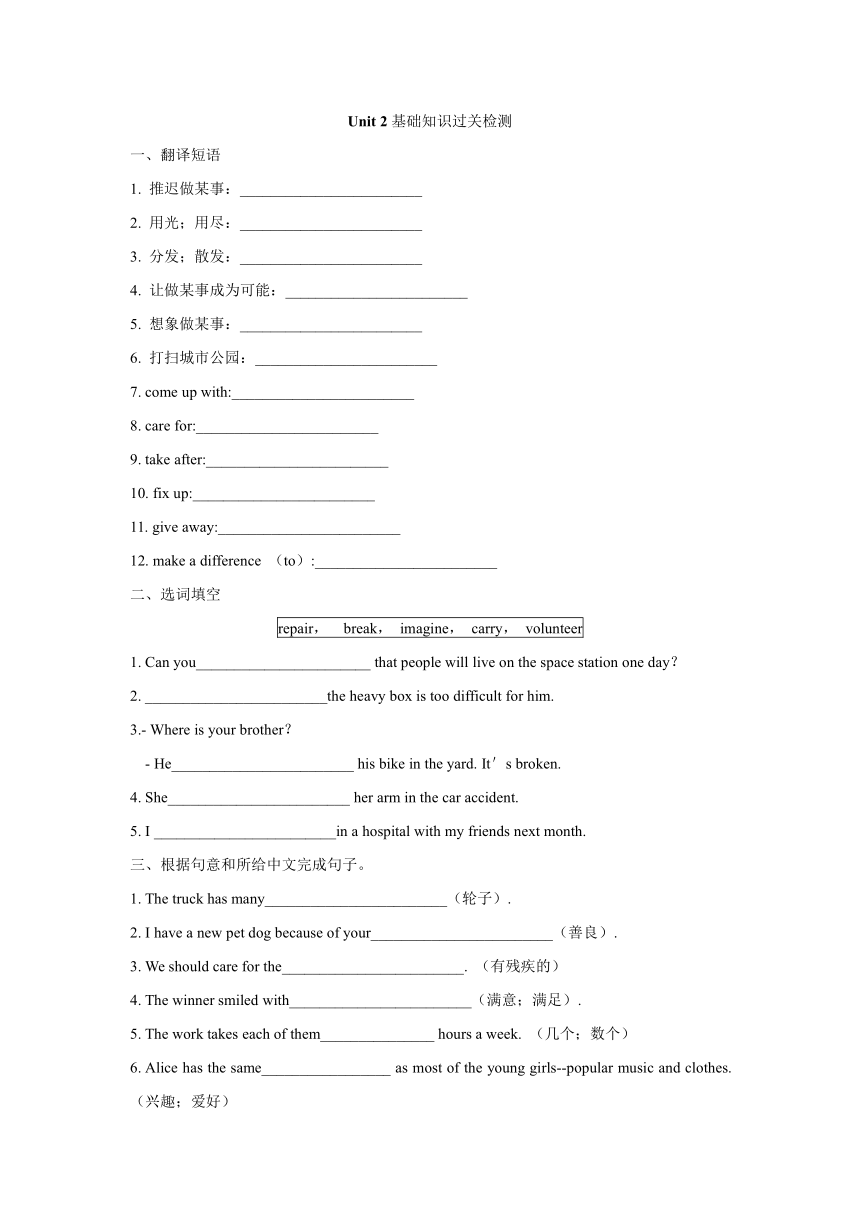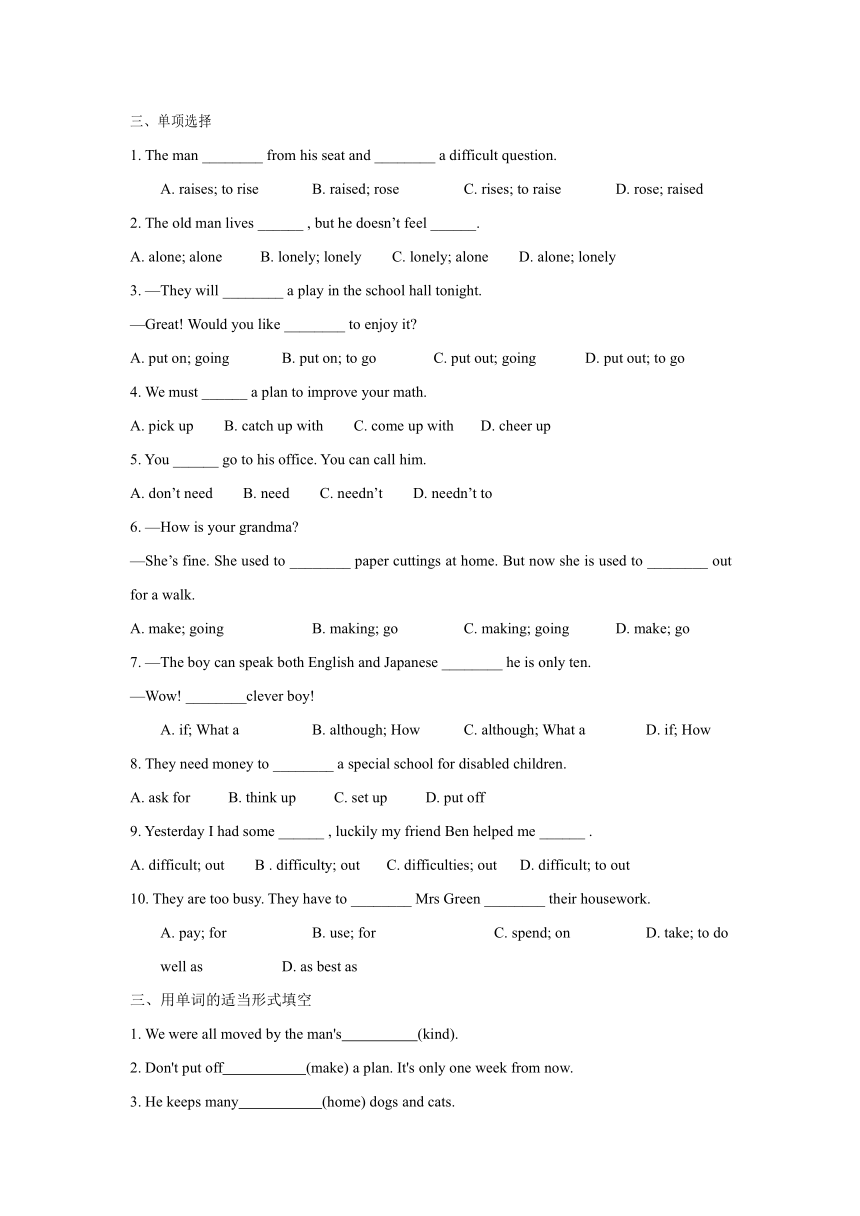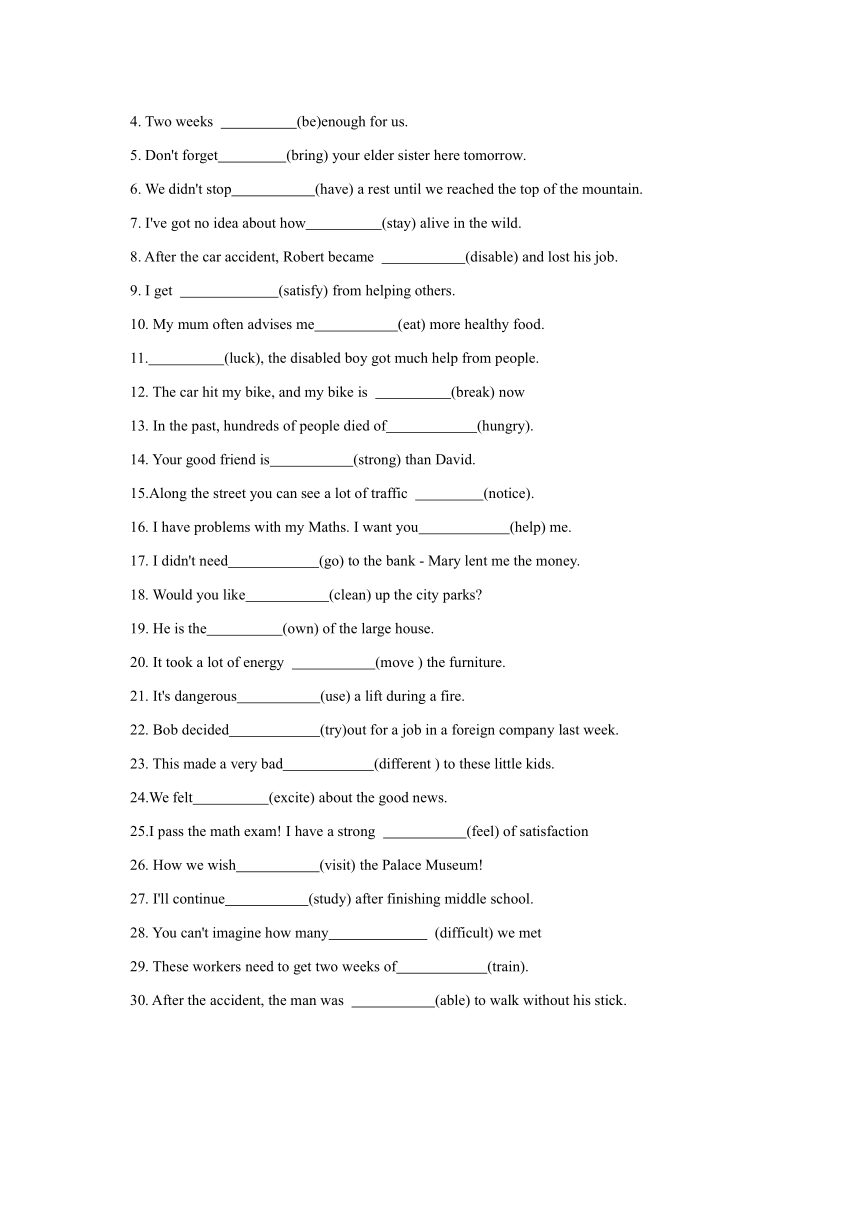Unit 2 I'll help to clean up the city parks.基础知识过关检测 (含答案) 人教版八年级下册
文档属性
| 名称 | Unit 2 I'll help to clean up the city parks.基础知识过关检测 (含答案) 人教版八年级下册 |  | |
| 格式 | docx | ||
| 文件大小 | 28.5KB | ||
| 资源类型 | 教案 | ||
| 版本资源 | 人教新目标(Go for it)版 | ||
| 科目 | 英语 | ||
| 更新时间 | 2025-02-23 17:11:13 | ||
图片预览



文档简介
Unit 2基础知识过关检测
一、翻译短语
1. 推迟做某事:________________________
2. 用光;用尽:________________________
3. 分发;散发:________________________
4. 让做某事成为可能:________________________
5. 想象做某事:________________________
6. 打扫城市公园:________________________
7. come up with:________________________
8. care for:________________________
9. take after:________________________
10. fix up:________________________
11. give away:________________________
12. make a difference (to):________________________
二、选词填空
repair, break, imagine, carry, volunteer
1. Can you_______________________ that people will live on the space station one day?
2. ________________________the heavy box is too difficult for him.
3.- Where is your brother?
- He________________________ his bike in the yard. It's broken.
4. She________________________ her arm in the car accident.
5. I ________________________in a hospital with my friends next month.
三、根据句意和所给中文完成句子。
1. The truck has many________________________(轮子).
2. I have a new pet dog because of your________________________(善良).
3. We should care for the________________________. (有残疾的)
4. The winner smiled with________________________(满意;满足).
5. The work takes each of them_______________ hours a week. (几个;数个)
6. Alice has the same_________________ as most of the young girls--popular music and clothes. (兴趣;爱好)
三、单项选择
1. The man ________ from his seat and ________ a difficult question.
A. raises; to rise B. raised; rose C. rises; to raise D. rose; raised
2. The old man lives ______ , but he doesn’t feel ______.
A. alone; alone B. lonely; lonely C. lonely; alone D. alone; lonely
3. —They will ________ a play in the school hall tonight.
—Great! Would you like ________ to enjoy it
A. put on; going B. put on; to go C. put out; going D. put out; to go
4. We must ______ a plan to improve your math.
A. pick up B. catch up with C. come up with D. cheer up
5. You ______ go to his office. You can call him.
A. don’t need B. need C. needn’t D. needn’t to
6. —How is your grandma
—She’s fine. She used to ________ paper cuttings at home. But now she is used to ________ out for a walk.
A. make; going B. making; go C. making; going D. make; go
7. —The boy can speak both English and Japanese ________ he is only ten.
—Wow! ________clever boy!
A. if; What a B. although; How C. although; What a D. if; How
8. They need money to ________ a special school for disabled children.
A. ask for B. think up C. set up D. put off
9. Yesterday I had some ______ , luckily my friend Ben helped me ______ .
A. difficult; out B . difficulty; out C. difficulties; out D. difficult; to out
10. They are too busy. They have to ________ Mrs Green ________ their housework.
A. pay; for B. use; for C. spend; on D. take; to do
well as D. as best as
三、用单词的适当形式填空
1. We were all moved by the man's (kind).
2. Don't put off (make) a plan. It's only one week from now.
3. He keeps many (home) dogs and cats.
4. Two weeks (be)enough for us.
5. Don't forget (bring) your elder sister here tomorrow.
6. We didn't stop (have) a rest until we reached the top of the mountain.
7. I've got no idea about how (stay) alive in the wild.
8. After the car accident, Robert became (disable) and lost his job.
9. I get (satisfy) from helping others.
10. My mum often advises me (eat) more healthy food.
11. (luck), the disabled boy got much help from people.
12. The car hit my bike, and my bike is (break) now
13. In the past, hundreds of people died of (hungry).
14. Your good friend is (strong) than David.
15.Along the street you can see a lot of traffic (notice).
16. I have problems with my Maths. I want you (help) me.
17. I didn't need (go) to the bank - Mary lent me the money.
18. Would you like (clean) up the city parks
19. He is the (own) of the large house.
20. It took a lot of energy (move ) the furniture.
21. It's dangerous (use) a lift during a fire.
22. Bob decided (try)out for a job in a foreign company last week.
23. This made a very bad (different ) to these little kids.
24.We felt (excite) about the good news.
25.I pass the math exam! I have a strong (feel) of satisfaction
26. How we wish (visit) the Palace Museum!
27. I'll continue (study) after finishing middle school.
28. You can't imagine how many (difficult) we met
29. These workers need to get two weeks of (train).
30. After the accident, the man was (able) to walk without his stick.
一、翻译短语
put off doing sth.
run out (of)
give out / hand out
make it possible to do sth.
imagine doing sth.
clean up the city parks
想出;提出(主意、计划、回答等)
照顾;非常喜欢
(外貌或行为)像
修理;装饰
赠送;捐赠
(对……)有影响;起作用
二、选词填空
imagine
Carrying
is repairing
broke
will volunteer
三、根据句意和所给中文完成句子
wheels
kindness
disabled
satisfaction
several
interests
三、单项选择
D
解析:rise 是不及物动词,意为 “站起来,升起”,过去式是 rose;raise 是及物动词,意为 “提出,举起”,过去式是 raised。句子意思是 “这个人从座位上站起来,提出了一个难题”,第一个空表示 “站起来”,用 rose;第二个空表示 “提出”,用 raised,所以选 D。
D
解析:alone 作副词,意为 “独自地”,强调客观上独自一人;lonely 作形容词,意为 “孤独的”,强调主观感受。句子意思是 “这位老人独自生活,但他并不感到孤独”,第一个空用 alone 修饰 lives,第二个空用 lonely 作 feel 的表语,所以选 D。
B
解析:put on 有 “上演” 的意思,put out 意为 “熄灭”。根据句意 “他们今晚将在学校礼堂上演一场戏剧”,第一个空用 put on;would like to do sth. 是固定搭配,意为 “想要做某事”,所以第二个空用 to go,选 B。
C
解析:pick up 意为 “捡起;(开车)接载”;catch up with 意为 “赶上”;come up with 意为 “想出”;cheer up 意为 “使振作起来”。根据 “a plan to improve your math” 可知是要想出一个提高数学的计划,所以选 C。
C
解析:need 作实义动词时,其否定形式为 don't /doesn't need to do sth.;作情态动词时,其否定形式为 needn't do sth.。这里表示 “你不必去他办公室”,后面直接接动词原形 go,所以 need 是情态动词,否定形式为 needn't,选 C。
A
解析:used to do sth. 表示 “过去常常做某事”;be used to doing sth. 表示 “习惯于做某事”。第一个空表示 “她过去常常在家剪纸”,用 make;第二个空表示 “但现在她习惯出去散步”,用 going,所以选 A。
C
解析:if 意为 “如果”;although 意为 “尽管”。根据句意 “这个男孩虽然只有十岁,但他会说英语和日语”,第一个空用 although;感叹句中,What + a /an + 形容词 + 可数名词单数 (+ 主语 + 谓语)!How + 形容词 / 副词 (+ 主语 + 谓语)!这里 “clever boy” 是 “形容词 + 可数名词单数” 结构,所以用 What a,选 C。
C
解析:ask for 意为 “请求;要求”;think up 意为 “想出”;set up 意为 “建立”;put off 意为 “推迟”。根据 “a special school for disabled children” 可知是要建立一所特殊学校,所以选 C。
C
解析:difficult 是形容词,difficulty 是名词,some 后接可数名词复数或不可数名词,这里表示 “一些困难”,用 difficulties;help sb. out 是固定短语,意为 “帮助某人摆脱困境”,所以选 C。
A
解析:pay sb. for sth. 表示 “为某事向某人付钱”;use sth. for... 表示 “用某物做……”;spend... on sth. 表示 “在某事上花费……”;take 常用于 It takes sb. some time to do sth. 结构。根据 “Mrs Green” 和 “their housework” 可知是付钱给格林夫人做家务,所以选 A。
三、用单词的适当形式填空
kindness
解析:名词所有格 man's 后接名词,kind 的名词形式是 kindness,意为 “善良”。
making
解析:put off doing sth. 是固定搭配,意为 “推迟做某事”,所以用 making。
homeless
解析:根据语境 “他收养了很多…… 的猫狗”,这里需要一个形容词修饰 dogs and cats,home 的形容词 homeless 意为 “无家可归的”,符合语境。
is
解析:时间、距离等作主语时,通常看作一个整体,谓语动词用单数形式,所以用 is。
to bring
解析:forget to do sth. 表示 “忘记去做某事(事情还没做)”,这里是不要忘记明天把姐姐带来,所以用 to bring。
to have
解析:stop to do sth. 表示 “停下来去做另一件事”,stop doing sth. 表示 “停止正在做的事”。根据 “直到我们到达山顶才停下来休息”,这里是停下来去休息,所以用 to have。
to stay
解析:“疑问词 + 动词不定式” 结构可以作宾语,这里 how to stay alive 作 about 的宾语,意为 “如何在野外生存”。
disabled
解析:become 是系动词,后接形容词作表语,disable 的形容词形式是 disabled,意为 “残疾的”。
satisfaction
解析:get 后接名词作宾语,satisfy 的名词形式是 satisfaction,意为 “满足”。
to eat
解析:advise sb. to do sth. 是固定搭配,意为 “建议某人做某事”,所以用 to eat。
Luckily
解析:这里用副词修饰整个句子,luck 的副词形式是 luckily,意为 “幸运地”,句首首字母大写。
broken
解析:is 是系动词,后接形容词作表语,break 的形容词形式是 broken,意为 “坏了的”。
hunger
解析:die of 后接名词,hungry 的名词形式是 hunger,意为 “饥饿”。
stronger
解析:than 是比较级的标志词,strong 的比较级是 stronger,所以用 stronger。
notices
解析:a lot of 后接可数名词复数或不可数名词,notice 作 “告示,通知” 讲时是可数名词,所以用 notices。
to help
解析:want sb. to do sth. 是固定搭配,意为 “想要某人做某事”,所以用 to help。
to go
解析:need 在这里是实义动词,其否定形式为 don't /doesn't need to do sth.,所以用 to go。
to clean
解析:would like to do sth. 是固定搭配,意为 “想要做某事”,所以用 to clean。
owner
解析:the... of 结构中,of 前用名词,own 的名词形式是 owner,意为 “所有者”。
to move
解析:It takes (sb.) some time /energy to do sth. 是固定句型,意为 “做某事花费(某人)一些时间 / 精力”,所以用 to move。
to use
解析:It's + 形容词 + to do sth. 是固定句型,意为 “做某事是…… 的”,所以用 to use。
to try
解析:decide to do sth. 是固定搭配,意为 “决定做某事”,所以用 to try。
difference
解析:make a difference 是固定短语,意为 “有影响;起作用”,这里用 different 的名词形式 difference。
excited
解析:feel 是系动词,后接形容词作表语,修饰人用 excited,意为 “感到兴奋的”。
feeling
解析:a strong feeling of... 表示 “一种强烈的…… 感觉”,这里用 feel 的名词形式 feeling。
to visit
解析:wish to do sth. 是固定搭配,意为 “希望做某事”,所以用 to visit。
to study
解析:continue to do sth. 表示 “继续做另一件事”,continue doing sth. 表示 “继续做正在做的事”,这里表示中学毕业后继续学习(做另一件事),所以用 to study。
difficulties
解析:many 后接可数名词复数,difficult 的名词形式是 difficulty,复数为 difficulties。
training
解析:two weeks of 后接名词,train 的名词形式是 training,意为 “训练”。
unable
解析:根据 “the man was... to walk without his stick” 可知这个人没有拐杖就不能走路了,be unable to do sth. 表示 “不能做某事”,所以用 unable。
一、翻译短语
1. 推迟做某事:________________________
2. 用光;用尽:________________________
3. 分发;散发:________________________
4. 让做某事成为可能:________________________
5. 想象做某事:________________________
6. 打扫城市公园:________________________
7. come up with:________________________
8. care for:________________________
9. take after:________________________
10. fix up:________________________
11. give away:________________________
12. make a difference (to):________________________
二、选词填空
repair, break, imagine, carry, volunteer
1. Can you_______________________ that people will live on the space station one day?
2. ________________________the heavy box is too difficult for him.
3.- Where is your brother?
- He________________________ his bike in the yard. It's broken.
4. She________________________ her arm in the car accident.
5. I ________________________in a hospital with my friends next month.
三、根据句意和所给中文完成句子。
1. The truck has many________________________(轮子).
2. I have a new pet dog because of your________________________(善良).
3. We should care for the________________________. (有残疾的)
4. The winner smiled with________________________(满意;满足).
5. The work takes each of them_______________ hours a week. (几个;数个)
6. Alice has the same_________________ as most of the young girls--popular music and clothes. (兴趣;爱好)
三、单项选择
1. The man ________ from his seat and ________ a difficult question.
A. raises; to rise B. raised; rose C. rises; to raise D. rose; raised
2. The old man lives ______ , but he doesn’t feel ______.
A. alone; alone B. lonely; lonely C. lonely; alone D. alone; lonely
3. —They will ________ a play in the school hall tonight.
—Great! Would you like ________ to enjoy it
A. put on; going B. put on; to go C. put out; going D. put out; to go
4. We must ______ a plan to improve your math.
A. pick up B. catch up with C. come up with D. cheer up
5. You ______ go to his office. You can call him.
A. don’t need B. need C. needn’t D. needn’t to
6. —How is your grandma
—She’s fine. She used to ________ paper cuttings at home. But now she is used to ________ out for a walk.
A. make; going B. making; go C. making; going D. make; go
7. —The boy can speak both English and Japanese ________ he is only ten.
—Wow! ________clever boy!
A. if; What a B. although; How C. although; What a D. if; How
8. They need money to ________ a special school for disabled children.
A. ask for B. think up C. set up D. put off
9. Yesterday I had some ______ , luckily my friend Ben helped me ______ .
A. difficult; out B . difficulty; out C. difficulties; out D. difficult; to out
10. They are too busy. They have to ________ Mrs Green ________ their housework.
A. pay; for B. use; for C. spend; on D. take; to do
well as D. as best as
三、用单词的适当形式填空
1. We were all moved by the man's (kind).
2. Don't put off (make) a plan. It's only one week from now.
3. He keeps many (home) dogs and cats.
4. Two weeks (be)enough for us.
5. Don't forget (bring) your elder sister here tomorrow.
6. We didn't stop (have) a rest until we reached the top of the mountain.
7. I've got no idea about how (stay) alive in the wild.
8. After the car accident, Robert became (disable) and lost his job.
9. I get (satisfy) from helping others.
10. My mum often advises me (eat) more healthy food.
11. (luck), the disabled boy got much help from people.
12. The car hit my bike, and my bike is (break) now
13. In the past, hundreds of people died of (hungry).
14. Your good friend is (strong) than David.
15.Along the street you can see a lot of traffic (notice).
16. I have problems with my Maths. I want you (help) me.
17. I didn't need (go) to the bank - Mary lent me the money.
18. Would you like (clean) up the city parks
19. He is the (own) of the large house.
20. It took a lot of energy (move ) the furniture.
21. It's dangerous (use) a lift during a fire.
22. Bob decided (try)out for a job in a foreign company last week.
23. This made a very bad (different ) to these little kids.
24.We felt (excite) about the good news.
25.I pass the math exam! I have a strong (feel) of satisfaction
26. How we wish (visit) the Palace Museum!
27. I'll continue (study) after finishing middle school.
28. You can't imagine how many (difficult) we met
29. These workers need to get two weeks of (train).
30. After the accident, the man was (able) to walk without his stick.
一、翻译短语
put off doing sth.
run out (of)
give out / hand out
make it possible to do sth.
imagine doing sth.
clean up the city parks
想出;提出(主意、计划、回答等)
照顾;非常喜欢
(外貌或行为)像
修理;装饰
赠送;捐赠
(对……)有影响;起作用
二、选词填空
imagine
Carrying
is repairing
broke
will volunteer
三、根据句意和所给中文完成句子
wheels
kindness
disabled
satisfaction
several
interests
三、单项选择
D
解析:rise 是不及物动词,意为 “站起来,升起”,过去式是 rose;raise 是及物动词,意为 “提出,举起”,过去式是 raised。句子意思是 “这个人从座位上站起来,提出了一个难题”,第一个空表示 “站起来”,用 rose;第二个空表示 “提出”,用 raised,所以选 D。
D
解析:alone 作副词,意为 “独自地”,强调客观上独自一人;lonely 作形容词,意为 “孤独的”,强调主观感受。句子意思是 “这位老人独自生活,但他并不感到孤独”,第一个空用 alone 修饰 lives,第二个空用 lonely 作 feel 的表语,所以选 D。
B
解析:put on 有 “上演” 的意思,put out 意为 “熄灭”。根据句意 “他们今晚将在学校礼堂上演一场戏剧”,第一个空用 put on;would like to do sth. 是固定搭配,意为 “想要做某事”,所以第二个空用 to go,选 B。
C
解析:pick up 意为 “捡起;(开车)接载”;catch up with 意为 “赶上”;come up with 意为 “想出”;cheer up 意为 “使振作起来”。根据 “a plan to improve your math” 可知是要想出一个提高数学的计划,所以选 C。
C
解析:need 作实义动词时,其否定形式为 don't /doesn't need to do sth.;作情态动词时,其否定形式为 needn't do sth.。这里表示 “你不必去他办公室”,后面直接接动词原形 go,所以 need 是情态动词,否定形式为 needn't,选 C。
A
解析:used to do sth. 表示 “过去常常做某事”;be used to doing sth. 表示 “习惯于做某事”。第一个空表示 “她过去常常在家剪纸”,用 make;第二个空表示 “但现在她习惯出去散步”,用 going,所以选 A。
C
解析:if 意为 “如果”;although 意为 “尽管”。根据句意 “这个男孩虽然只有十岁,但他会说英语和日语”,第一个空用 although;感叹句中,What + a /an + 形容词 + 可数名词单数 (+ 主语 + 谓语)!How + 形容词 / 副词 (+ 主语 + 谓语)!这里 “clever boy” 是 “形容词 + 可数名词单数” 结构,所以用 What a,选 C。
C
解析:ask for 意为 “请求;要求”;think up 意为 “想出”;set up 意为 “建立”;put off 意为 “推迟”。根据 “a special school for disabled children” 可知是要建立一所特殊学校,所以选 C。
C
解析:difficult 是形容词,difficulty 是名词,some 后接可数名词复数或不可数名词,这里表示 “一些困难”,用 difficulties;help sb. out 是固定短语,意为 “帮助某人摆脱困境”,所以选 C。
A
解析:pay sb. for sth. 表示 “为某事向某人付钱”;use sth. for... 表示 “用某物做……”;spend... on sth. 表示 “在某事上花费……”;take 常用于 It takes sb. some time to do sth. 结构。根据 “Mrs Green” 和 “their housework” 可知是付钱给格林夫人做家务,所以选 A。
三、用单词的适当形式填空
kindness
解析:名词所有格 man's 后接名词,kind 的名词形式是 kindness,意为 “善良”。
making
解析:put off doing sth. 是固定搭配,意为 “推迟做某事”,所以用 making。
homeless
解析:根据语境 “他收养了很多…… 的猫狗”,这里需要一个形容词修饰 dogs and cats,home 的形容词 homeless 意为 “无家可归的”,符合语境。
is
解析:时间、距离等作主语时,通常看作一个整体,谓语动词用单数形式,所以用 is。
to bring
解析:forget to do sth. 表示 “忘记去做某事(事情还没做)”,这里是不要忘记明天把姐姐带来,所以用 to bring。
to have
解析:stop to do sth. 表示 “停下来去做另一件事”,stop doing sth. 表示 “停止正在做的事”。根据 “直到我们到达山顶才停下来休息”,这里是停下来去休息,所以用 to have。
to stay
解析:“疑问词 + 动词不定式” 结构可以作宾语,这里 how to stay alive 作 about 的宾语,意为 “如何在野外生存”。
disabled
解析:become 是系动词,后接形容词作表语,disable 的形容词形式是 disabled,意为 “残疾的”。
satisfaction
解析:get 后接名词作宾语,satisfy 的名词形式是 satisfaction,意为 “满足”。
to eat
解析:advise sb. to do sth. 是固定搭配,意为 “建议某人做某事”,所以用 to eat。
Luckily
解析:这里用副词修饰整个句子,luck 的副词形式是 luckily,意为 “幸运地”,句首首字母大写。
broken
解析:is 是系动词,后接形容词作表语,break 的形容词形式是 broken,意为 “坏了的”。
hunger
解析:die of 后接名词,hungry 的名词形式是 hunger,意为 “饥饿”。
stronger
解析:than 是比较级的标志词,strong 的比较级是 stronger,所以用 stronger。
notices
解析:a lot of 后接可数名词复数或不可数名词,notice 作 “告示,通知” 讲时是可数名词,所以用 notices。
to help
解析:want sb. to do sth. 是固定搭配,意为 “想要某人做某事”,所以用 to help。
to go
解析:need 在这里是实义动词,其否定形式为 don't /doesn't need to do sth.,所以用 to go。
to clean
解析:would like to do sth. 是固定搭配,意为 “想要做某事”,所以用 to clean。
owner
解析:the... of 结构中,of 前用名词,own 的名词形式是 owner,意为 “所有者”。
to move
解析:It takes (sb.) some time /energy to do sth. 是固定句型,意为 “做某事花费(某人)一些时间 / 精力”,所以用 to move。
to use
解析:It's + 形容词 + to do sth. 是固定句型,意为 “做某事是…… 的”,所以用 to use。
to try
解析:decide to do sth. 是固定搭配,意为 “决定做某事”,所以用 to try。
difference
解析:make a difference 是固定短语,意为 “有影响;起作用”,这里用 different 的名词形式 difference。
excited
解析:feel 是系动词,后接形容词作表语,修饰人用 excited,意为 “感到兴奋的”。
feeling
解析:a strong feeling of... 表示 “一种强烈的…… 感觉”,这里用 feel 的名词形式 feeling。
to visit
解析:wish to do sth. 是固定搭配,意为 “希望做某事”,所以用 to visit。
to study
解析:continue to do sth. 表示 “继续做另一件事”,continue doing sth. 表示 “继续做正在做的事”,这里表示中学毕业后继续学习(做另一件事),所以用 to study。
difficulties
解析:many 后接可数名词复数,difficult 的名词形式是 difficulty,复数为 difficulties。
training
解析:two weeks of 后接名词,train 的名词形式是 training,意为 “训练”。
unable
解析:根据 “the man was... to walk without his stick” 可知这个人没有拐杖就不能走路了,be unable to do sth. 表示 “不能做某事”,所以用 unable。
同课章节目录
- Unit 1 What's the matter?
- Section A
- Section B
- Unit 2 I'll help to clean up the city parks.
- Section A
- Section B
- Unit 3 Could you please clean your room?
- Section A
- Section B
- Unit 4 Why don't you talk to your parents?
- Section A
- Section B
- Unit 5 What were you doing when the rainstorm came
- Section A
- Section B
- Review of Units 1-5
- Unit 6 An old man tried to move the mountains.
- Section A
- Section B
- Unit 7 What's the highest mountain in the world?
- Section A
- Section B
- Unit 8 Have you read Treasure Island yet?
- Section A
- Section B
- Unit 9 Have you ever been to a museum?
- Section A
- Section B
- Unit 10 I've had this bike for three years.
- Section A
- Section B
